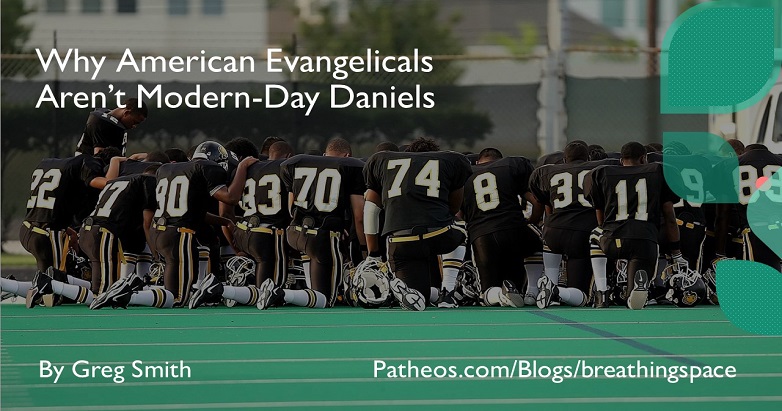Many White American Evangelicals consider themselves modern-day Daniels. Heroes in their own minds, they love the narrative of how they were forbidden to pray, yet they remained faithful. This is because it underscores their persecution narrative.

Kennedy
On June 27, Evangelicals celebrated the victory for prayer, given by the 6-3 decision of the US Supreme Court. High school football coach Joe Kennedy was removed from his position when he refused to obey the athletic director’s order to stop praying on the 50-yard line after games. According to CNN:
Kennedy began his prayer ritual soon after he was hired in 2008, but the school district grew concerned when Kennedy’s short, quiet prayers grew in 2015 as players began joining him on the field all while the crowd was still in the stands.
The school district said it never restricted him from offering silent, private prayers, and offered him an alternate place to pray off the football field after games. Kennedy refused the accommodations and was ultimately placed on paid administrative leave and suspended from the program.
Kennedy’s prayers were not a private matter for a private citizen. They were public and audible prayers, given while he was functioning as a government (public school) employee, on government property, and at a school function. Even so, the highest court in the land said that Kennedy was just exercising his freedom of religion and ruled in his favor. Evangelicals are celebrating the win and feeling like modern-day Daniels because of the persecution.
Daniel and Persecution
Christians love and identify with the biblical story of Daniel, a Hebrew prophet during the time of the Babylonian exile. In Daniel 6, the titular character defies a royal edict not to pray to anybody but the king. Instead, he continues his regular prayers to the Jewish God and is thrown into a den of lions for his defiance. Instead of being eaten by lions, Daniel is saved when God shuts the lions’ mouths. Daniel is rescued from the pit, and his enemies are thrown into the lions’ den and killed. When Evangelicals preach this story, they say, “If anybody tells you to stop praying, you’ve got to stand up for your faith—and God will see you through.”
The problem is that Daniel’s story has nothing to do with the American Evangelical experience. Daniel and his Hebrew counterparts were powerless exiles in the land of their conquerors. Quite the opposite, American Evangelicals hold most of the power in the United States. Jewish believers struggled to remain faithful even when the government and culture were actively trying to cancel their very identities. American Evangelicals complain about “cancel culture,” which is their code for, “Our power is being challenged!” White conservative Christians are trying to cancel Critical Race Theory, Pride Month, and other evidence of minorities gaining too much power.
Tebow, Phillips, and Robertson
Joe Kennedy isn’t alone in his hero status among American Evangelicals. He is simply the latest in the Christian hall of fame. “Persecuted Christians” often make money authoring books and going on speaking tours, talking about how they were persecuted.
Some Kennedy with Tim Tebow, one of Evangelicalism’s greatest heroes because of his kneeling prayers on the football field. In 2011, New York Times writer Greg Bishop wrote:
“At the intersection of faith and football, the fervor that surrounds both Tebow’s beliefs and his struggles in his second season for the Denver Broncos has escalated into a full-blown national debate over religion and its place in sports.”
In those days, the conversation among Evangelicals was all about how Tebow was persecuted by the NFL. When his career ended, everybody was sure it was because of his stand (or kneel) for Jesus.
Everybody remembers the 2012 debacle when Masterpiece Cake Shop’s owner Jack Phillips refused to make a cake for a gay couple’s wedding. Everybody remembers the Supreme Court battle surrounding Phillips’ right to discriminate based on his religious beliefs. Phillips became an Evangelical celebrity and advanced his career by writing The Cost of My Faith: How a Decision in My Cake Shop Took Me to the Supreme Court.
In 2013, Phil Robertson of Duck Dynasty said that A&E edited “in Jesus name” from the prayers on the show, because they didn’t want to offend Muslims. I attended an event at Liberty University where members of the Robertson family talked about this. Rather than a problem for them, this “persecution” became a talking point that advanced their career. Evangelicals doubled down on their support of the Robinsons and the Duck Dynasty franchise, resulting in more fortune for the family.
The Persecution Narrative
Christian book titles like Raising Daniels in a Babylonian World suggest that Evangelicals aren’t the ones in power and that they’re being persecuted. This is odd, considering that they hold most of the power in the US. Evangelicals enjoy the persecution narrative, forgetting that persecution happens when those in power exploit those without power. When conservatives say they’re being persecuted, what they really mean is that the minorities are getting uppity, and fundamentalists are losing their grip.
Jesus on Prayer-Heroes
American Evangelicals love their “persecuted” heroes. But Jesus didn’t want his followers to become prayer-heroes. In fact, he taught the opposite—that prayer and spirituality should be humble and private things. In Matthew 6:1-6 NRSV, Jesus said:
“Beware of practicing your righteousness before others in order to be seen by them, for then you have no reward from your Father in heaven.
“So whenever you give alms, do not sound a trumpet before you, as the hypocrites do in the synagogues and in the streets, so that they may be praised by others. Truly I tell you, they have received their reward. But when you give alms, do not let your left hand know what your right hand is doing, so that your alms may be done in secret, and your Father who sees in secret will reward you.
“And whenever you pray, do not be like the hypocrites, for they love to stand and pray in the synagogues and at the street corners, so that they may be seen by others. Truly I tell you, they have received their reward. But whenever you pray, go into your room and shut the door and pray to your Father who is in secret, and your Father who sees in secret will reward you.”
Public Vs. Corporate Prayer
It is important to note the difference between public and corporate prayer. Public prayer is the kind that Kennedy, Tebow, and Robertson engaged in—let’s call it “street-corner prayer.” This piety for the world to see is what Jesus warned against. It calls attention to the individual, rather than to God. The public is not there for the purpose of worship—they are there for sports, entertainment, or business. When celebrities, coaches, and civic leaders engage in public prayer, they do so at the expense of those who have gathered. They use their public platform as an opportunity to put their beliefs front and center.
This is not something you see people doing who are in the religious minority. It’s generally a conservative flexing of religious muscle, disguised as a genuine expression of faith. I’m not saying that Kennedy, Tebow, et cetera aren’t sincere in their beliefs. I’m saying that what underlies their actions is their Evangelical sense of moral superiority and a sense that Christians own the space where everybody has gathered. They would be appalled if their kids were on a football team where a Muslim, Wiccan, or Baha’i coach took the same religious liberties.
Corporate prayer is not the same thing as public prayer. Corporate prayer is when believers gather in a home, house of worship, or some private place for worship. This is never for show because worshipers are surrounded by other worshipers rather than the public eye or TV cameras. Jesus’ comments in Matthew 6 apply to public prayer, not corporate prayer. Jesus frequently attended the temple and synagogue. He also led his followers in corporate prayer.
Evangelicals Aren’t Modern-Day Daniels
The Evangelical love of the Daniel story is often no more than a persecution complex. White American Evangelicals know nothing of Daniel’s experience. Daniel was a person of color. He was a religious and ethnic minority. He was an immigrant. He was enslaved. When he refused to stop praying, he was holding onto the last shred of identity and faith that he possessed. He was powerless in a land of oppressors. Until White American Evangelicals experience these things, they should stop seeing themselves as Modern-Day Daniels.












